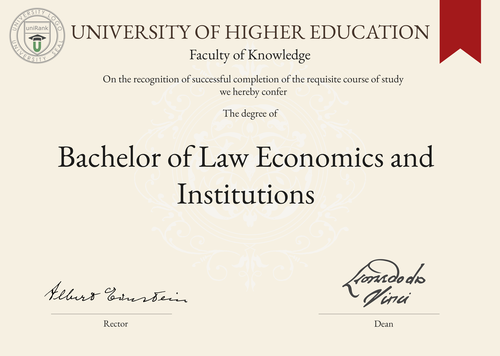
Bachelor of Law Economics and Institutions (LLB (Economics and Institutions))
Guide to University Programs/Courses
Bachelor of Law Economics and Institutions (LLB (Economics and Institutions))

Program/Course Name
Bachelor of Law Economics and InstitutionsProgram/Course Abbreviation
LLB (Bachelor of Laws)Duration Range
3-4 yearsTuition range
Varies by country and university. Please check with specific institutions for accurate information.Overview
The Bachelor of Law Economics and Institutions program is designed to provide students with a comprehensive understanding of the legal system, economics and institutions. This interdisciplinary program combines legal studies with economics, allowing students to develop a strong foundation in both fields.Curriculum Overview by Year
Year 1: Introduction to Law, Microeconomics, Legal Writing, Introduction to InstitutionsYear 2: Macroeconomics, Contract Law, Public Law, Law and EconomicsYear 3: International Law, Competition Law, Econometrics, Legal Research MethodsYear 4: Elective courses, Internship opportunities, DissertationKey Components
- Legal studies: Students will gain a deep understanding of various areas of law, including contract law, public law, international law and competition law.- Economics: The program incorporates economic principles and theories to analyze legal issues and understand the impact of legal decisions on the economy.- Institutions: Students will study the role and functioning of institutions in the legal and economic systems.Career Prospects
Graduates of the Bachelor of Law Economics and Institutions program can pursue various career paths, including:- Legal professions: Lawyers, legal consultants, legal advisors- Economic analysts: Economic consultants, policy analysts, research analysts- Government positions: Regulatory bodies, public administration, international organizations- Corporate sector: Compliance officers, business analysts, contract managersSalary Expectations
Salary expectations for graduates of the Bachelor of Law Economics and Institutions program can vary significantly based on factors such as location, experience and industry. It is recommended to research specific job roles and industries for accurate salary information. For a more accurate understanding of salary expectations, you can utilize the Job Sites Search Engine, from our sister site jobRank, which searches over 4,600 job sites worldwide. Make sure to specify not only the job title but also the country you are interested in.Conclusions
It is important to note that the duration, tuition fees, curriculum, key components, career prospects and salary expectations of the Bachelor of Law Economics and Institutions program can vary depending on the country or location where you choose to study and the university you select. It is advisable to thoroughly research and compare different universities and their offerings before making a decision. Visitors interested in pursuing this specific degree can utilize the uniRank World Universities Search Engine to find institutions offering the program worldwide.World Universities Search Engine
search for Bachelor of Law Economics and Institutions (LLB (Economics and Institutions)) and add the Location (country, state etc.) or specific University you are interested in studying at.
Query examples:
- Bachelor of Law Economics and Institutions (LLB (Economics and Institutions)) United States
- Bachelor of Law Economics and Institutions (LLB (Economics and Institutions)) United Kingdom online
- Bachelor of Law Economics and Institutions (LLB (Economics and Institutions)) Australia international students
- Bachelor of Law Economics and Institutions (LLB (Economics and Institutions)) University of California
- Bachelor of Law Economics and Institutions (LLB (Economics and Institutions)) University of London tuition fees
- Bachelor of Law Economics and Institutions (LLB (Economics and Institutions)) University of Sydney scholarships